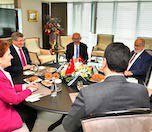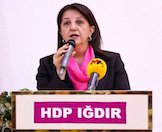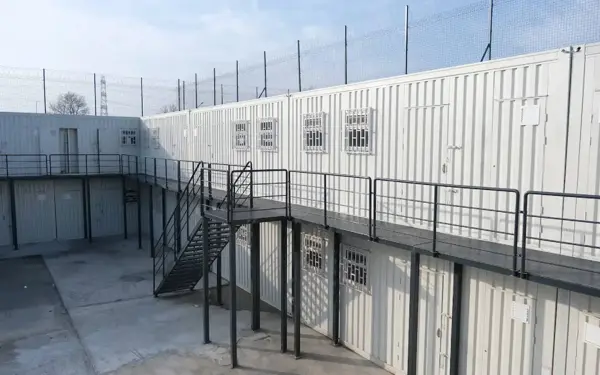Click to read the article in Turkish
The Memorandum of Understanding (MOU) on Common Policies announced by the opposition alliance Table of Six yesterday (January 30) is judicial reform, but it has deficiencies, according to Veysel Ok who is the co-founder of the Media and Law Studies Association (MLSA) and a lawyer.
The most important deficiency is that the program announced does not go into the Anti-Terror Law, says Veysel Ok.
Ok has evaluated the section of the MOU on "Law, Justice, and Jurisdiction" for bianet.
The lawyer said, "The reform package is important but deficient. I searched for an amendment to the Anti-Terror Law. Because many who are convicted or arrested at the moment are in prison due to the Anti-Terror Law. Or under judicial harassment.
"Unless the provisions such as the crimes of propaganda of an organization, organization membership, targeting people who serve in anti-terror struggle are amended, no journalist, no politician, no elected person, no citizen can live freely in Türkiye. Therefore the issues related to the Anti-Terror Law are missing in the program," stated Ok.
"What about judges who caused unjust suffering?"
Ok also told bianet about the issues related to the members of the judiciary who violated the laws and who caused unjust suffering for many people.
Ok said, "The second thing that strikes my attention is the restructuring of the Supreme Court for Judges and Prosecutors (HSK) and the Constitutional Court. The content of the text is correct here. However, what about the members of the judiciary who did not follow the ECtHR rulings, who arrested people unjustly and caused them to stay in prison for years? No suggestion is put forward as to what is going to be done in relation to them."
"What will happen to the members of the judiciary who committed a crime?" asked Ok and added, "Those who did not release Demirtaş, did not release Kavala, imposed penalties in the Gezi park case, arrested journalists and politicians, and gave verdicts contradicting the constitution or the laws; will they continue to serve? Or will we be able to have them stand trials for the unjust suffering they have caused? These are not included in the program."
Ok also said, "Generally speaking, there are important reforms but our basic problem is the independence of the judiciary and the terror comprehension in Türkiye. People will continue to suffer unjustly unless amendments are made in line with the case law of the ECtHR or the European Convention on Human Rights.
"Besides, there are very clear and significant assessments on the independence of the judiciary, the power the government has over HSK, the election procedures of HSK, and the independence of the lawyers. The equality of the lawyers and the prosecutor in the courtroom, that the judges cannot be appointed to different provinces against their will, putting an end to the muti-bar system, and facilitating the applications to the Constitutional Court, are all very important.
"However, no matter which reform you make, you cannot reach a solution in Türkiye without changing the mentality of the judges."
MOU on Common Policies
The six political parties of the Nation Alliance, an election alliance also known as Table of Six, announced yesterday their MOU on Common Policies which will constitute the main axis of the election manifesto and government program of the presidential candidate of the alliance.
The alliance is going to run with a joint candidate in the presidential elections and will seek the support of other opposition parties and alliances, first of all the pro-Kurdish People's Democratic Party (HDP), the third largest party in the parliament.
The MOU of common policies of the Table of Six declared yesterday promise "a shift to a Strengthened Parliamentary System for a strong, liberal, democratic and just system in which the separation of powers is established through an effective and participatory legislative, a stable, transparent and accountable executive, and an independent and impartial judiciary."
Some important aspects of the MOU in relation to law, justice, and judiciary are as follows:
A new bylaw will be prepared for the Parliament (TBMM). The opposition will be represented strongly in the parliamentary commissions.
Parliamentary immunity will not have any exception arising from article 14 of the Constitution. Making of omnibus bills will be brought to an end.
It will not be possible for basic rights and freedoms to be regulated with decrees.
A "constitutional guarantee" will be brought stating that the power to withdraw from international conventions rests with the Parliament.
The Presidency will be without political responsibility and impartial. The President will not be a member of a political party.
The President will serve for one period and the term will be 7 years. The President will not return to politics after the term in office.
The President will not have the power to issue decrees.
There will be a structural transformation in order to establish the independence of the judiciary besides constitutional and legal amendments.
The judges and the prosecutors will be separated occupationally. The judges will no longer be affiliated with the Ministry of Justice in their administrative duties.
Special jurisdiction procedures and specially authorized courts will be put to an end.
Measures will be taken so that the rulings of the Constitutional Court and of the ECtHR are taken into account and that they are implemented.
HSK will be abolished and two different councils will be set up, one the Council of Judges and the other the Council of Prosecutors.
The Constitutional Court will be restructured and empowered.
Regulations will be made so that both Forensic Institution reports and reports of the state hospitals identified by the Ministry will be taken into account for the release of ill and disabled prisoners. (HA/PE)





.jpg)


.jpg)






